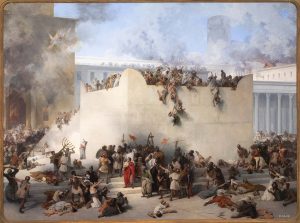Some of you will remember the Youngbloods’ song Get Together.
It is a prayer for ourselves and our world as we welcome Shabbat.
Shabbat Shalom
Some of you will remember the Youngbloods’ song Get Together.
It is a prayer for ourselves and our world as we welcome Shabbat.
Shabbat Shalom
Our God and God of our ancestors, with hope and humility we approach Election Day, the day on which We the People will choose the individuals who will govern our nation, our states, and our communities.
You have abundantly blessed the United States of America with freedom, security, prosperity, and the right to democratic self-government. You made it possible for the founders of our country to fulfill the command of Your Torah, to “proclaim liberty throughout the land, and unto all the inhabitants thereof.”
Daily we pray to You to restore our leaders as in former times. On this Election Day, help us to remember that in America we are responsible for choosing our own leaders, and that the survival of our democracy, and the well-being of generations of Americans to come, depend upon the care we take in those choices.
Daily we pray to You for knowledge, discernment and wisdom. On this Election Day grant us those blessings in full, so that we may consider our choices with knowledge and vote with discernment and wisdom, with the best interests of our country and our communities in mind.
Daily we pray to You to subdue the arrogant in our time. On Election Day, and every day, help us to subdue the arrogance within ourselves. Open our hearts and minds to consider the opinions of our fellow citizens, as we call upon them to consider ours.
Strengthen our will to fulfill our duties to our country and to one another. To exercise our precious right to vote. And to do all we can to ensure that every legal vote is counted, regardless of the candidate or party for whom it is cast.
May it be Your will that our decisions this Election Day preserve this country as a wellspring of liberty and a beacon of tolerance and democracy for the entire world.
And let us say Amen.
 As we approach this time of year, a recurring debate arises about allowing our children to partake in Halloween. Some Individuals express concerns that Halloween promotes devil worship. However, Halloween has its roots in a Celtic festival that celebrated the harvest with bonfires to ward off ghosts and evil spirits and mourn the dead. This tradition is not unique to Halloween and is found in various cultures. Black Cats and Witches emerged much later, in the Middle Ages.
As we approach this time of year, a recurring debate arises about allowing our children to partake in Halloween. Some Individuals express concerns that Halloween promotes devil worship. However, Halloween has its roots in a Celtic festival that celebrated the harvest with bonfires to ward off ghosts and evil spirits and mourn the dead. This tradition is not unique to Halloween and is found in various cultures. Black Cats and Witches emerged much later, in the Middle Ages.
It’s a time for children to don their favorite costumes, explore their neighborhoods, gather sweet treats, and revel in the joy of being outdoors. The sheer excitement and happiness on their faces is a sight to behold.
Something is enchanting about bringing the imagination to bear on costumes and needing to go through the ritual of sorting out the candy as loot candies will be eaten, what candies will be discarded, and how much can be consumed less our children get a bellyache. Of course, that says nothing of the sugar high they will get as they gorge themselves on candy bars. It also says nothing for all of the food they consume between the time they end their trick-or-treating and return home to share the spoils.
Amidst all the real horrors and evils in the world, a night of innocent fun for our children seems like a harmless and enjoyable way to spend some time. Instead of dwelling on Halloween’s potential dark origins or superstitions, let’s embrace it as a moment to unleash our imaginations, step out, and have a good time.
Happy Halloween!

We spend a lot of time talking about Clal Yisrael or Am Israel, the unity of the Jewish people, the fantastic idea that we are all one. However, it’s never seemed to be the case that everyone who claims Jewish identity considers themselves part of this group. We seem to be very easily swayed into looking at denominations and other forms of Jewish practice as false or authentic and often just plain old wrong.
We don’t have a creed; we have something called Halacha. We practice and interpret the law very differently. This is, historically, a source of strength, allowing our tradition to evolve and be organic, but it’s also been the source of a lot of fighting. It creates a very fractious “people.” Indeed, I wonder if Clal Yisrael is a misnomer. However, from the outside, it is a different story.
When others on the outside look, they see Jews. They do not make distinctions between religious Jews, secular Jews, Zionist Jews, orthodox Jews, and the like; to them, it’s just Jews. We’ve seen that mainly through the world’s antisemitism, the Jew-hatred that unites us from the outside.
This brings me to the idea of Sinat Chinam, the concept of “baseless hatred” that we often use as the reason for the internal friction leading to the downfalls of the first and the second temple. It sounds lofty, radical, and extreme. It’s easy for most of us to talk about it as a foreign object and disclaim any connection to it. We believe we are not so strident while at the same time criticizing those who do not practice Judaism as we do. But that is precisely what our sages were talking about when discussing the concept. It’s not some deeply ingrained hatred of another denomination but our inability to accept that your Judaism is as authentic and valid as my Judaism. Your practice is a true expression of your understanding of our faith tradition. As is mine.
So it’s about the annoyance. It’s about the intolerance. It’s about the inflexibility. It’s about the idea that because I am right, you must be wrong. This concept was developed by a teacher and friend, Rabbi Brad Hirshfield, in his book “You Don’t Have to Be Wrong for Me to Be Right.” It’s the idea that we can look at each other with understanding and appreciation, even if it’s not how we practice Judaism.
We must find a way to move past our judgment of each other and our intolerance of what we see when it doesn’t comport with what we believe is our tradition’s “proper” practice. The Jewish tent is broad enough to encompass us all.
We acknowledge and mark Juneteenth, the 19th of June, to celebrate the day the United States fully recognized the Emancipation Proclamation.
This significant day, Juneteenth, was not the day of the Emancipation Proclamation, which declared the end of Slavery in the United States. Instead, it was the day when news of Lincoln’s historic decree reached the enslaved people of Galveston, Texas. Carried by 2,000 Union Troops, this news brought the long-awaited freedom to these individuals. Juneteenth stands as a pivotal moment in the journey towards realizing the ideals of the Declaration of Independence, that “All men are created equal, that they are endowed by their Creator with certain unalienable Rights, that among these are Life, Liberty, and the pursuit of Happiness.“ The journey towards freedom began on January 1, 1863, when Lincoln proclaimed that all enslaved people within the rebellious states were to be free. However, this news took two more years to reach Galveston, Texas, in 1865. The word of freedom has since spread across the nation, but the task of turning the dream encapsulated in those words into a reality is an ongoing one.
The New Golden Age, the convening of a Black-Jewish alliance sponsored by Culture Changing Christians and the Jewish Community Relations Council of the Jewish Federation of Greater Philadelphia is a testament to the enduring significance of Juneteenth. This occasion, which celebrates the date and renews our commitment to the American vision of freedom and equality for all, underscores the ongoing relevance of Juneteenth. It serves as a reminder that the work towards realizing this vision is not yet complete, but together, we strive to fulfill that dream.
This statement was drafted by Pastor Carl Day and Rabbi David Levin of the New Golden Age.
***
The New Golden Age is a joint partnership between the Jewish and Black communities in Philadelphia focused on combating hate, enhancing security, and strengthening the local community’s social safety net. This initiative was started by The Jewish Community Relations Council (JCRC) of the Jewish Federation of Greater Philadelphia and the Culture Changing Christians.
Jews are using the phrase “we are the canary in the coal mine” as a warning that anti-Semitism signals growing hatred of all groups in our nation. This idea is profoundly flawed, ironically counterproductive, and requires immediate redress.
anti-Semitism signals growing hatred of all groups in our nation. This idea is profoundly flawed, ironically counterproductive, and requires immediate redress.
The phrase is a desperate appeal to others that they must fight anti-Semitism as it inevitably will lead to hatred against them—that tactic won’t work. People will stand against anti-Semitism because it is wrong. And if they can rationalize anti-Semitism, they won’t care about Jews, canaries, or anyone else. Besides, there is another group that already experiences an institutional brand of hatred: black people and others of color.
People of color have been experiencing hatred and systemic racism for as long as any of us have come to these shores. When we think of Jews as the ones on the front line, we negate the experience of the black community. That is egotistical and shameful and ironically belies the idea embodied in the Canary Phrase. We should be aware of this hatred and align with those others who experience it.
I am not a canary, and I am not in a coal mine. Despite the alarming sharp increase in public displays of anti-Semitism, we live well, thoroughly enjoying so many blessings of this place. We have the power and the means to defend ourselves. And we are. Others do not, and we must help them.
Let us stand against hatred in all its forms besides every one of goodwill. We denounce hatred of any group and work together to fight it on the streets, in the courts, and our hearts. So our country may live up to its aspirations.
We are not birds; we are American Jews standing tall for the values we believe in, and together, we will prevail.
Anti-Semitism is here. It is ugly and real. It never went away, even though we almost believed it did. This is not a time to cower; it is a time to act decisively and urgently.
Our strength lies in our unity and our shared values. We are not alone in this fight but bound together by a tradition of wisdom and insight rooted in humanity’s best values. With these as our guide, we will overcome.
Let’s shift from sorrow to action. In these challenging times, let our Judaism be our strength. Seek the light and community that fortify us. Stand firm in our beliefs; together, we will construct a world founded on love and kindness. Let’s stand shoulder-to-shoulder with our fellow Jews, extend our blessings to those in need, and illuminate the world. Let’s also reach out to other allies, all people of goodwill, and unite for a common cause. Evil will not triumph. Together, we will flood the world with light, pushing back the darkness to where it belongs.
The news from Bryn Mawr is ambivalent.
There is good news and bad news.
First, the good news:
The courts intervened, and the BMFI must now show the film.
Now, the bad news:
Bryn Mawr Film Institute has not retracted its statement nor amended its thinking.
So, we get to see a movie in a place that is hostile to showing it.
The stakes have been raised on both sides as the film is now set to be shown. Those supporting the right to see the movie and those protesting Israel will be out in full force. I hope that each side can express their views without hindrance from the other. Whichever side you are on, strive for peace.
You guys at BMFI need to rethink your leadership. Whoever is in charge should be thanked for their past service and shown the door. Until at least a meaningful apology is offered, consider me a former member.
In response to the Bryn Mawr Film Institute’s decision to cancel the showing of the film The Child Within Me, I make the following statement:
To the Board of the Bryn Mawr Film Institute
You squandered an essential moment of leadership.
Until this decision, you were a cultural icon and an important voice in our community. But instead of devotion to keeping culture accessible through film, its thoughtful curation, and presentation, you cowed in the face of political pressure. You canceled a film thoroughly unrelated to the war. The only controversy about this film is your decision to condemn it because the Israeli Film Festival sponsors it. Shame on you.
People protesting against the showing of a film is an act of free speech. It does not automatically devolve into violence, and using that as a pretense for canceling is a sign of it is either fecklessness or outright bias against Jews (also known as Antisemitism) and Israel.
Protesters are loud and obnoxious, but they are not violent. Those who attend the festival would find them uncomfortable, but they are not a physical threat. Further, the police of Lower Merion would have done an excellent job of keeping the peace even in this potentially testy situation.
BMFI was an important institution, one I enjoyed participating in and supporting. However, I am deeply disappointed that you have focused on other aspects, neglecting the crucial role of bringing influential films into our community. This decision has undermined the basis for our relationship. I resign from my membership and call on everyone in our community to do the same.
Sincerely
Rabbi David Levin